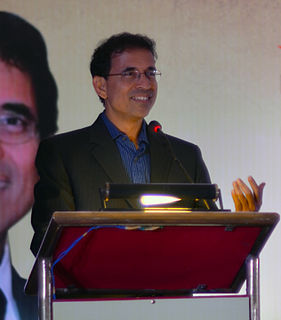A Quote by David Foster Wallace
Hear this or not, as you will. Learn it now, or later -- the world has time. Routine, repetition, tedium, monotony, ephemeracy, inconsequence, abstraction, disorder, boredom, angst, ennui -- these are the true hero's enemies, and make no mistake, they are fearsome indeed. For they are real.
Related Quotes
In the development of the understanding of complex phenomena, the most powerful tool available to the human intellect is abstraction. Abstraction arises from the recognition of similarities between certain objects, situations, or processes in the real world and the decision to concentrate on these similarities and to ignore, for the time being, their differences.
Sports teaches you there is always a second innings in life. If you fail today, theres a second innings maybe two days later. Maybe theres another opportunity coming up three or six months later. If you look at mistake as learnings and commit never to make a same mistake again, then you actually get better with every mistake that you make.
Sports teaches you there is always a second innings in life. If you fail today, there's a second innings maybe two days later. Maybe there's another opportunity coming up three or six months later. If you look at mistake as learnings and commit never to make a same mistake again, then you actually get better with every mistake that you make.
People are afraid of trying something new, of failing even before they start. My point is, what is the worst that can happen? You will fail and friends who warned you will say 'I told you so!' So you made a mistake - and will hopefully make many more. But hey! The real tragedy is not the mistake you make, but not learning from it.
In this sad world of ours sorrow comes to all and it often comes with bitter agony. Perfect relief is not possible except with time. You cannot now believe that you will ever feel better. But this is not true. You are sure to be happy again. Knowing this, truly believing it will make you less miserable now. I have had enough experience to make this statement.
Do you think that every time you make a mistake, He is mad at you and won't talk to you...or that you must somehow make up for it?...Many Christians fail to experience real peace because they don't understand that they are righteous in Christ. Until people stop living according to the way they feel and stand on who they are in Christ, they will never find true happiness.
I believe that our society's "mistake-phobia" is crippling, a problem that begins in most elementary schools, where we learn to learn what we are taught rather than to form our own goals and to figure out how to achieve them. We are fed with facts and tested and those who make the fewest mistakes are considered to be the smart ones, so we learn that it is embarrassing to not know and to make mistakes. Our education system spends virtually no time on how to learn from mistakes, yet this is critical to real learning.





































